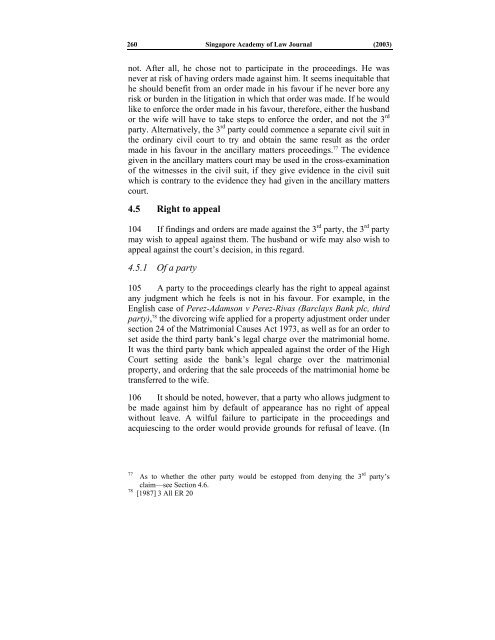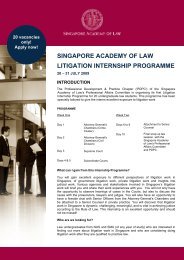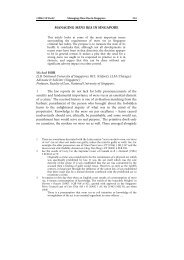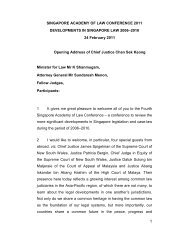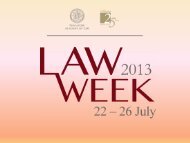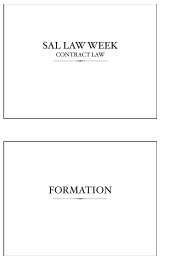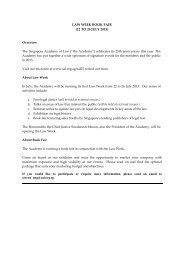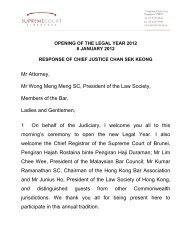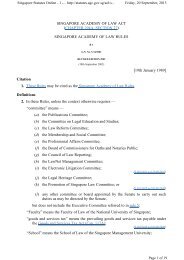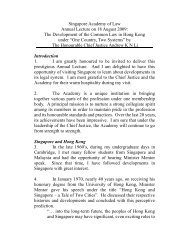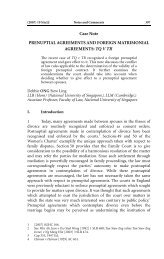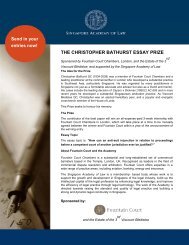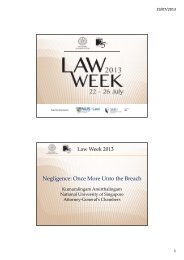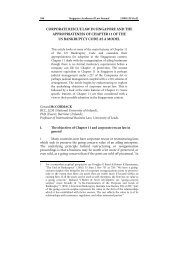View Article - Singapore Academy of Law
View Article - Singapore Academy of Law
View Article - Singapore Academy of Law
Create successful ePaper yourself
Turn your PDF publications into a flip-book with our unique Google optimized e-Paper software.
260<br />
<strong>Singapore</strong> <strong>Academy</strong> <strong>of</strong> <strong>Law</strong> Journal (2003)<br />
not. After all, he chose not to participate in the proceedings. He was<br />
never at risk <strong>of</strong> having orders made against him. It seems inequitable that<br />
he should benefit from an order made in his favour if he never bore any<br />
risk or burden in the litigation in which that order was made. If he would<br />
like to enforce the order made in his favour, therefore, either the husband<br />
or the wife will have to take steps to enforce the order, and not the 3 rd<br />
party. Alternatively, the 3 rd party could commence a separate civil suit in<br />
the ordinary civil court to try and obtain the same result as the order<br />
made in his favour in the ancillary matters proceedings. 77 The evidence<br />
given in the ancillary matters court may be used in the cross-examination<br />
<strong>of</strong> the witnesses in the civil suit, if they give evidence in the civil suit<br />
which is contrary to the evidence they had given in the ancillary matters<br />
court.<br />
4.5 Right to appeal<br />
104 If findings and orders are made against the 3 rd party, the 3 rd party<br />
may wish to appeal against them. The husband or wife may also wish to<br />
appeal against the court’s decision, in this regard.<br />
4.5.1 Of a party<br />
105 A party to the proceedings clearly has the right to appeal against<br />
any judgment which he feels is not in his favour. For example, in the<br />
English case <strong>of</strong> Perez-Adamson v Perez-Rivas (Barclays Bank plc, third<br />
party), 78 the divorcing wife applied for a property adjustment order under<br />
section 24 <strong>of</strong> the Matrimonial Causes Act 1973, as well as for an order to<br />
set aside the third party bank’s legal charge over the matrimonial home.<br />
It was the third party bank which appealed against the order <strong>of</strong> the High<br />
Court setting aside the bank’s legal charge over the matrimonial<br />
property, and ordering that the sale proceeds <strong>of</strong> the matrimonial home be<br />
transferred to the wife.<br />
106 It should be noted, however, that a party who allows judgment to<br />
be made against him by default <strong>of</strong> appearance has no right <strong>of</strong> appeal<br />
without leave. A wilful failure to participate in the proceedings and<br />
acquiescing to the order would provide grounds for refusal <strong>of</strong> leave. (In<br />
77<br />
As to whether the other party would be estopped from denying the 3 rd<br />
claim—see Section 4.6.<br />
78 [1987] 3 All ER 20<br />
party’s


